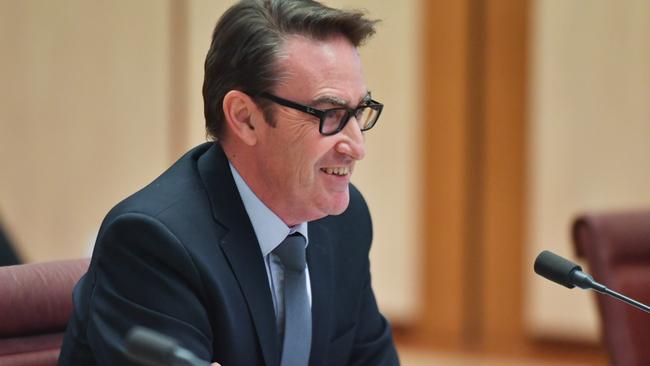Dollars running out the door, Senate told
Treasury secretary Steven Kennedy has told a Senate committee that about $10bn has been pumped into the economy over the past three weeks.

Treasury secretary Steven Kennedy has told a Senate committee that about $10bn has been pumped into the economy over the past three weeks as part of measures taken to cushion the blow from the COVID crisis.
Dr Kennedy defended the department against criticisms the money was taking too long to get to struggling households and businesses, saying that the dollars “are running out remarkably quickly”.
“We have not seen a shock hit this fast (and) making billions of dollars of payments within four weeks of an announcement I would regard as a rapid payment of money, and I don’t see what the alternative would be,” he told a Senate select committee into the government’s response to the pandemic on Tuesday.
Of that $10bn, it was roughly split between the $750 payments to households, and the business cash flow boost of at least $10,000, the committee heard.
Speaking at the same hearing, deputy Treasury secretary Jenny Wilkinson said it was her department’s advice to government that four weeks was the quickest it could get the payments flowing following the March 30 JobKeeper announcement. That included two weeks to bed down the rules and then two weeks for eligible businesses to apply.
“We were rolling out a very large program in a very short period of time,” Ms Wilkinson said.
Nearly 597,000 eligible businesses have now enrolled for the JobKeeper program, according to the most recent Treasury figures.
Dr Kennedy also credited the government with acting “decisively and early” to restrict the spread of the virus, with a “balanced approach to restrictions”.
This early success had allowed more of the economy to stay open through the crisis, Dr Kennedy said, with manufacturing, mining and construction continuing to operate through the pandemic.
Our relative success compares to other countries such as the UK, Spain, France, and parts of Canada and the US, which have been forced to put in place complete shutdowns, at a much greater economic cost.
Dr Kennedy referred to OECD research which suggested more complete shutdowns led to a 25 to 35 per cent drop in economic activity for each quarter that a complete lockdown persisted.
“We are not anywhere near that impact,” he said. “We have managed to keep more of our economy open, and that has benefited our income and employment prospects.”
Nonetheless, Dr Kennedy warned that “some jobs and businesses will have been lost permanently” as a result of the health crisis, which has sparked an economic hit of unprecedented “speed, magnitude and shape”.
He reiterated the Treasury view that unemployment will reach 10 per cent in this quarter. The jobless figure rose to a higher level during the Great Depression of the 1930s, but “it did that in a couple of years; this is happening in a couple of months”.




To join the conversation, please log in. Don't have an account? Register
Join the conversation, you are commenting as Logout